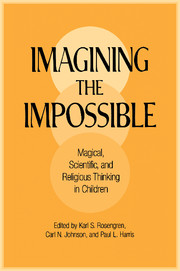Book contents
- Frontmatter
- Contents
- Contributors
- Acknowledgments
- Preface
- 1 The Makings of the Magical Mind: The Nature and Function of Sympathetic Magical Thinking
- 2 Phenomenalistic Perception and Rational Understanding in the Mind of an Individual: A Fight for Dominance
- 3 Metamorphosis and Magic: The Development of Children's Thinking About Possible Events and Plausible Mechanisms
- 4 The Development of Beliefs About Direct Mental-Physical Causality in Imagination, Magic, and Religion
- 5 Intuitive Ontology and Cultural Input in the Acquisition of Religious Concepts
- 6 On Not Falling Down to Earth: Children's Metaphysical Questions
- 7 Putting Different Things Together: The Development of Metaphysical Thinking
- 8 Versions of Personal Storytelling/Versions of Experience: Genres as Tools for Creating Alternate Realities
- 9 The Influence of Religious Beliefs on Parental Attitudes About Children's Fantasy Behavior
- 10 Religion, Culture, and Beliefs About Reality in Moral Reasoning
- 11 Beyond Scopes: Why Creationism Is Here to Stay
- 12 Knowledge Change in Response to Data in Science, Religion, and Magic
- 13 Theology and Physical Science: A Story of Developmental Influence at the Boundaries
- Index
9 - The Influence of Religious Beliefs on Parental Attitudes About Children's Fantasy Behavior
Published online by Cambridge University Press: 07 September 2010
- Frontmatter
- Contents
- Contributors
- Acknowledgments
- Preface
- 1 The Makings of the Magical Mind: The Nature and Function of Sympathetic Magical Thinking
- 2 Phenomenalistic Perception and Rational Understanding in the Mind of an Individual: A Fight for Dominance
- 3 Metamorphosis and Magic: The Development of Children's Thinking About Possible Events and Plausible Mechanisms
- 4 The Development of Beliefs About Direct Mental-Physical Causality in Imagination, Magic, and Religion
- 5 Intuitive Ontology and Cultural Input in the Acquisition of Religious Concepts
- 6 On Not Falling Down to Earth: Children's Metaphysical Questions
- 7 Putting Different Things Together: The Development of Metaphysical Thinking
- 8 Versions of Personal Storytelling/Versions of Experience: Genres as Tools for Creating Alternate Realities
- 9 The Influence of Religious Beliefs on Parental Attitudes About Children's Fantasy Behavior
- 10 Religion, Culture, and Beliefs About Reality in Moral Reasoning
- 11 Beyond Scopes: Why Creationism Is Here to Stay
- 12 Knowledge Change in Response to Data in Science, Religion, and Magic
- 13 Theology and Physical Science: A Story of Developmental Influence at the Boundaries
- Index
Summary
Around our house we try to keep our kids from having imaginary companions. I think they are associated with the devil and it would be very bad if they had imaginary companions. I try to emphasize that imaginary companions are bad so he doesn't have an imaginary companion.
This quote is from a mother who participated in our research investigating the role of imaginary companions in children's lives. In this work, an imaginary companion was defined as a vivid imaginary character (person, animal) with whom a child interacts during his/her play and daily activities. The extremely negative remarks of a few parents, who, like the mother quoted above, identified themselves as fundamentalist Christians, stand in marked contrast to the positive view of imaginary companions expressed by most middle-class American parents (Manosevitz, Fling, & Prentice, 1977; Mauro, 1991) and developmental psychologists. Although in the past some researchers have voiced concerns about children who regularly play with imaginary companions (Ames & Learned, 1946), recent research evidence associates having an imaginary companion with a variety of positive attributes, such as the ability to take the perspective of another person (Taylor & Carlson, 1997) and get along well with others (Singer & Singer, 1990), participation in family activities (Manosevitz, Prentice, & Wilson, 1973), and literary creativity (Schaefer, 1969; for a review see Taylor, 1999). More generally, children's capacity to pretend has been linked to a wide range of social and cognitive skills, including language development (Ervin-Tripp, 1991), social competence (Singer & Singer, 1990), memory development (Newman, 1990), exploration and mastery of emotional themes (Bretherton, 1989), and logical reasoning (Dias & Harris, 1990).
- Type
- Chapter
- Information
- Imagining the ImpossibleMagical, Scientific, and Religious Thinking in Children, pp. 247 - 268Publisher: Cambridge University PressPrint publication year: 2000
- 19
- Cited by



